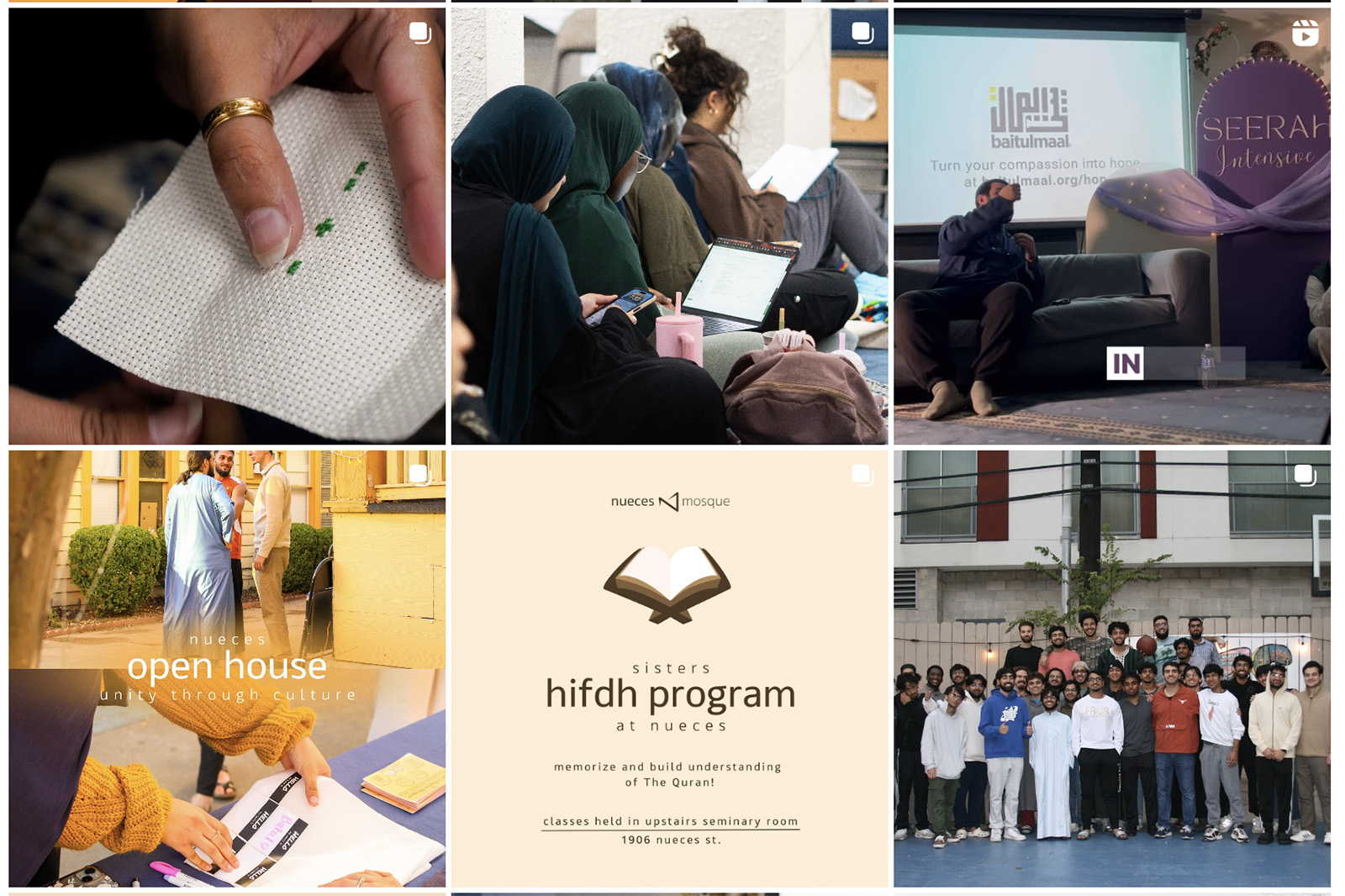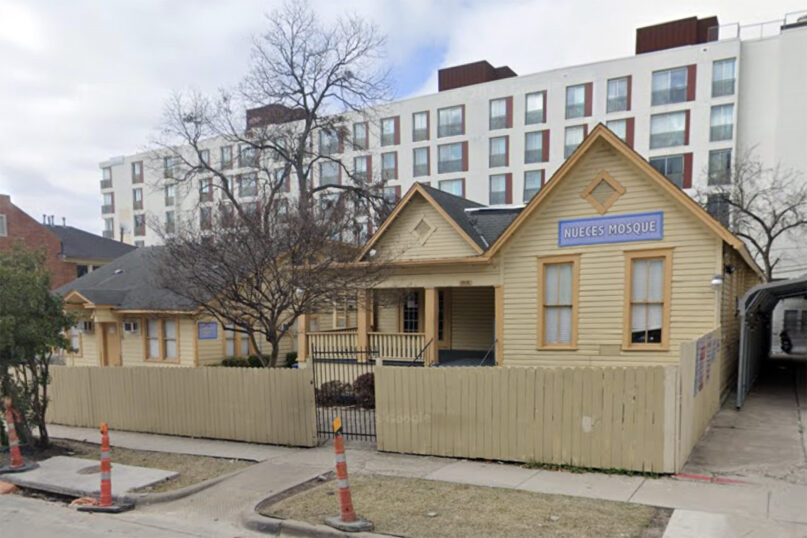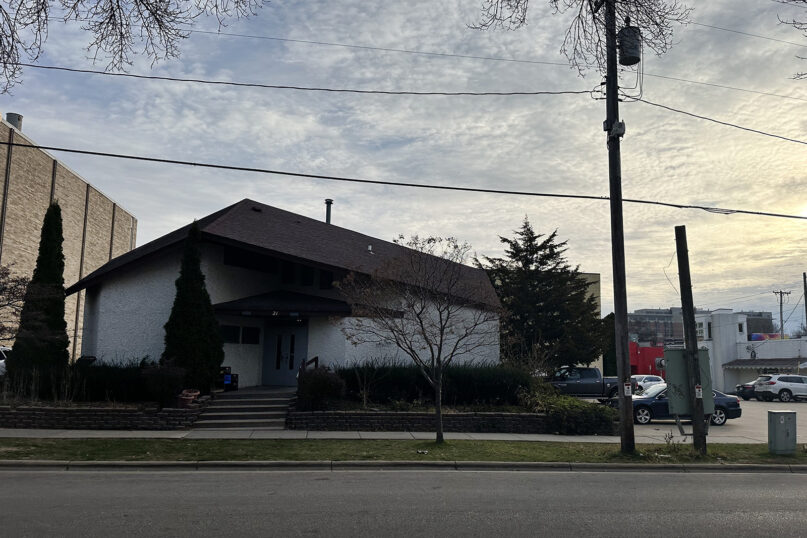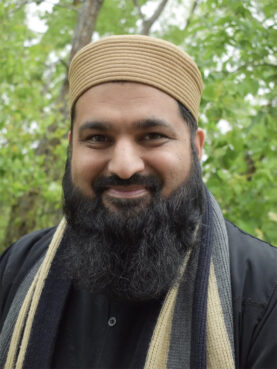
(RNS) — Imam Anwer Imam, a Muslim clergyman in Austin, Texas, remembers his wife telling him that he seemed more himself in his sessions talking to college students about their faith. “Even my own parents,” he said in a recent interview, would tell him, “Your jokes are funnier. You look happier when you’re preparing for those sessions. I used to joke, ‘I wish there was a mosque just full of college kids.’”
Now, he leads one — or rather, he allows the kids to do so.
At Nueces mosque, a three-minute walk from the University of Texas at Austin but with no official affiliation with the university, a majority of the congregation is made up of students and young professionals. Under Imam’s supervision the teens and 20-somethings take the lead in the liturgies and even mosque administration.
It’s a community that Inaya Sheikh, a senior at the school and public relations director at Nueces, said most of the students have never had before.
“A majority of religious centers are run by older people who have experience and wisdom but also lack in certain areas when it comes to connecting with younger folks and catering to their needs, making them feel welcome and helping them grow,” Sheikh said.
Filling that gap, mosques like Nueces and others on and near university campuses around the United States tailor their services to younger congregants, encouraging them to learn to lead prayers and providing opportunities for students interested in public speaking or leadership roles.

Nueces Mosque in Austin, Texas. (Image courtesy of Google Maps)
They also provide community for many young Muslims, who make up the bulk of the U.S. Muslim population. In 2017, Pew Research Center found that Muslims are “considerably younger than the overall U.S. adult population,” with more than a third between 18 and 29 years old, “a far higher percentage than the share of the general population that falls in that age bracket (21%),” Pew said.
A 2020 study by PRRI, a research group that tracks American religion, similarly showed that the average age among Muslim adults in the U.S. is 33, “significantly lower than the median for all Americans (47), and among the youngest of all religious groups.”
At least nine universities in the U.S. have mosques on or near their campuses that serve younger congregations, including Texas A&M in College Station, Texas Tech in Lubbock, University of Arizona, University of Washington Notre Dame, New York University, University of Wisconsin-Madison, University of Texas at Austin and Georgetown.
Imam, who has led Nueces mosque since finishing a seminary program in Dallas three years ago, said he fell in love with the community at Nueces.
“It’s a very niche kind of time in university students’ lives,” he said. “It’s beneficial for them to plug into any mosque, but having one on campus, where even the day-to-day programs, classes and seminars are managed and curated by students, for students adds a layer.”
He added: “They’ve dedicated a portion of their life to serve something beyond themselves, to serve the community. I think it’s something very, very beautiful.”
Another near-campus mosque, the Islamic Center of Madison, is located minutes from the University of Wisconsin-Madison. Ibrahim Saeed, president of the mosque, called it a “training ground” for students who want to get more involved with reciting the Quran or giving the khutbah — the formal sermon given during Friday prayer or on special occasions.

The Islamic Center of Madison in Madison, Wis. (Photo by Audrey Thibert)
“We test students who show interest to see how good is their reading on the Quran, all kinds of things,” Saeed said. “If I’m not there or somebody else is not there, then some of the students will lead. That’s very interesting for them. They are very happy with that.”
Saeed said about 10 students help lead night prayer during Ramadan, which can take over an hour to complete.
Saeed, who is also the imam at the Islamic Center of Madison, has committed to making the mosque a home for the students. “We told them, ‘This is your place, it’s not ours,’” he said. “We lead the thing, but it’s your place. I think they feel more at home when you let one of them lead the prayer.”
To help prepare the students to give their talks, Saeed sits with them and listens to their reading, recitation and pronunciation of Arabic letters.
Aslam Sayeeduddin, who graduated from the University of Wisconsin-Madison last year, gave talks at the student mosque in Madison starting in spring of 2023. He said the experience gave him an opportunity to share with the Muslim student community the traditional version of Islam he follows. Sayeeduddin emphasizes that he is not a learned person or an imam, but has spent a lot of time picking up on what scholars have taught him.

Imam Anwer Imam. (Photo courtesy of Nueces Mosque)
“Obviously, you’ve got 18- or 19-year-old students doing this, some of them for the first time. They’re going to make mistakes,” Imam said. “We at Nueces kind of embrace it. We expect them to make mistakes. Otherwise, how can we correct them?”
Students at Nueces who want to give talks go through training workshops, then practice in front of Imam to get feedback. Imam gives his students autonomy to lead projects they are passionate about, as long as they run it by him first. “My role is I sort of reality-test, validate and temper some of their ideas,” he said. “And put them through the ethos of Islamic values.”
And at the Islamic Center of East Lansing in Michigan, Aamir Baig, a senior at Michigan State University and a member of the school’s Muslim Student Association, has been leading night prayers at the Islamic center for more than four years, and through a program at the mosque has memorized the Quran.
Baig said life at the mosque, which is on the Michigan State campus but not officially affiliated with the university, is driven by the youth, including a strong representation from the area’s high schools.
“Until last year, it was just me leading the sermons, but now we’re getting more participation from the other college students who want to lead and who want to be involved in public speaking and things like that,” Baig said. “Our mosque is really good at incorporating the youth from a younger age too if they want to be engaged in the community here.”
Nueces also offers a seminary program that helps Sheikh and other students learn about the foundations of Islam through a biweekly class. But she said it’s about more than just learning about their religion. “It’s just a great way for students to not just practice their religion or their religious duties, but also basic things like public speaking and research and making sure they’re able to communicate specific things with a large audience,” Sheikh said.
Sheikh said she has been able to develop her leadership skills and grow professionally. “I think in the same way as in the political realm, we’re seeing a lot of older people taking the lead, which there’s nothing wrong with,” Sheikh said. “But I think we also need to pave a way for the younger generation to participate and gain experience.
She added: “I also do think that there is so much value in having elders in your community. One thing Islam preaches is seeking advice and consult from your elders. In order for us to ensure that we are doing the best we can to serve our community, we want to make sure that we’re seeking that advice and checking in with our elders.”
Imam, who hopes Nueces will serve as a model for all campuses, said the mosque offers the broader Muslim community the virtues of both youth and age. “The Muslim community, especially with these campus mosques, has struck a really beautiful balance,” he said.
This article was produced as part of the RNS/Interfaith America Religion Journalism Fellowship.
